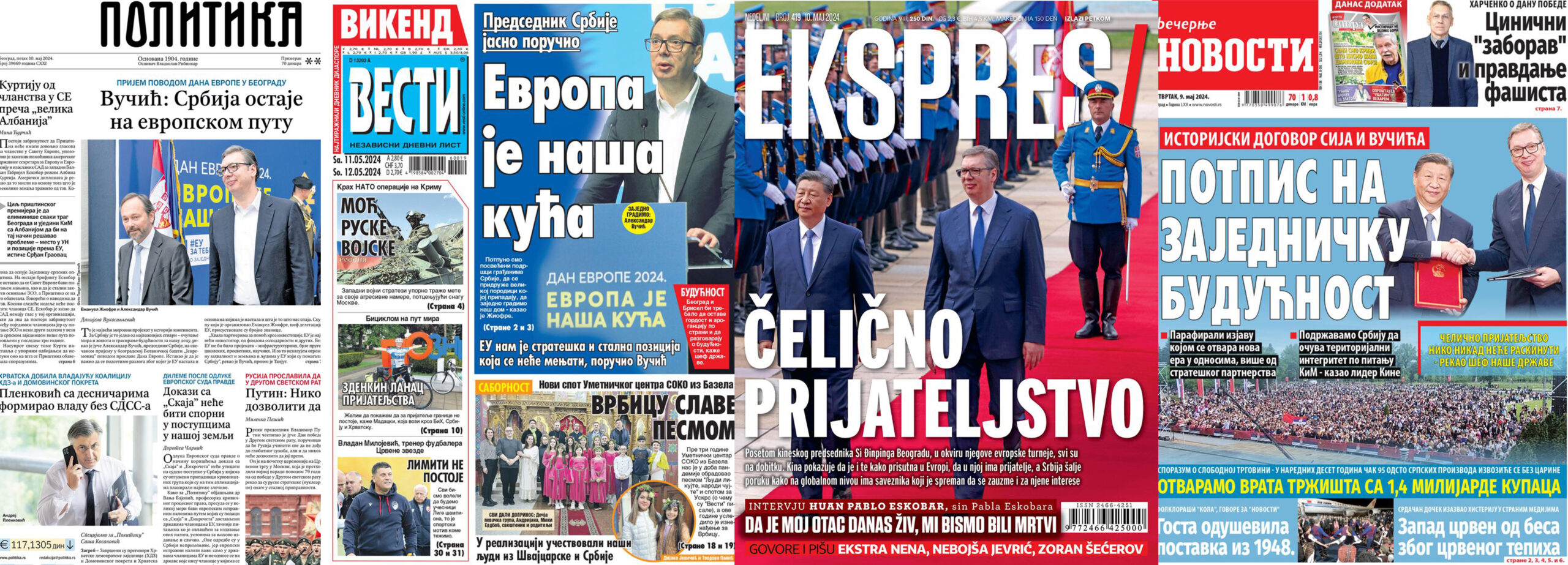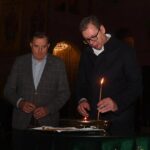Active work of the Serbian leadership in the first half of May, immediately after a new government has been appointed, is rather impressive. On the one hand, it is clear that Belgrade continues its campaign against the adoption of the Resolution on Srebrenica and against Kosovo’s membership in the Council of Europe. But, on the other hand, the scale of international engagements gives reason to suggest some more advanced plans on the part of Aleksandar Vučić.
The schedule of international events with the participation of the Serbian leadership in the first half of May was really rich and diverse.
• On May 7-8, a 400-strong Chinese delegation headed by President Xi Jinping visited Belgrade. The visit resulted in an agreement on a “shared future” between China and Serbia, signed by President Aleksandar Vucic and President Xi Jinping, and nearly 30 memoranda and other agreements.
“The Republic of Serbia and the People’s Republic of China are moving from the strategic relationship to which we have managed to raise our bilateral relations to the common future for our two countries. This is the highest form of cooperation between the two nations,” the Serbian president emphasized.
• On May 9, President Vučić, Speaker Brnabić, Prime Minister Vučević, and several ministers took part in a festive reception on the occasion of Europe’s Day, organized in Belgrade by the EU Delegation.
Vučić emphasized that choosing the European path was a strategic decision for Serbia.
• On May 9, Minister of Foreign Affairs Marko Djuric met in Belgrade with U.S. Ambassador Christopher Hill. Strengthening cooperation with the United States is one of the priorities of Serbia’s foreign policy, the head of Serbian diplomacy said.
• On May 9, Serbian Deputy Prime Minister Aleksandar Vulin, Ministers Nenad Popović, Nemanja Starović, Milica Đurđević Stamenkovski, and Nikola Selaković took part in the pro-Russian propaganda march “Immortal Regiment”, organized in Belgrade.
Minister of Family Affairs and Demography Milica Đurđević Stamenkovski stressed that no one is able to undermine the Serbian-Russian friendship.
• On May 10, Minister of Foreign Affairs Marko Đurić met with Russian Ambassador Alexander Botsan-Kharchenko. At the meeting, the head of the Serbian Foreign Ministry informed the Russian diplomat about the foreign policy priorities of the new government, expressing hope that relations between the two countries will continue to develop in the spirit of traditional friendship, mutual respect, and strategic partnership.
• On May 13, Serbian President Aleksandar Vučić had a meeting with EU Enlargement Commissioner Olivér Várhelyi. Following the meeting, Vučić noted that the country would continue to prepare for EU membership. The Serbian president also expressed hope that the inconsistency of the Serbian foreign policy with that of the EU would pose no obstacles on the way.
• On May 13, President Vučić met in Belgrade with Ukraine’s First Lady Olena Zelenska and Minister for Foreign Affairs Dmytro Kuleba.
“We discussed and agreed on improving bilateral relations,” Vučić said after talks with Kuleba.
The Ukrainian minister also held meetings with Prime Minister of Serbia Miloš Vučević, Speaker of the People’s Assembly Ana Brnabić, and Minister of Foreign Affairs Marko Đurić.
• On May 13, Assembly Speaker Ana Brnabić spoke with the Ambassador of Russia in Belgrade, Aleksandr Botsan-Kharchenko, to discuss possible forms of parliamentary cooperation between the two countries.
• On May 14, President Vučić met with Russia’s Ambassador, Alexandr Botsan-Kharchenko, expressing gratitude to Russia for its firm position regarding Serbia’s territorial integrity and sovereignty.
• On May 14, Prime Minister Miloš Vučević received U.S. Ambassador Christopher Hill, expressing belief that the successful cooperation between the two countries will continue.
• On May 15, Serbian President Aleksandar Vučić met with the U.S. underSecretary of State for Public Diplomacy and Public Affairs Elizabeth Allen, discussing the issue of strengthening bilateral relations.
• On May 15, Prime Minister Miloš Vučević met with Russian Ambassador Alexander Botsan Kharchenko to express gratitude to Russia over its firm stance on Serbia’s territorial integrity and sovereignty.
This timeline could be extended to include other dates and events but this period is most informative. In fact, these meetings with foreign leaders and officials fully reflected Belgrade’s current multi-vector policy. It is about Serbia’s traditional balancing between East and West. However, in this case, the latest international engagements on the part of Belgrade is a manifestation of the unambiguous and clear course the Serbian authorities are pursuing to promote their current, tactical interests.
These include
• Blocking Kosovo’s accession to the Council of Europe,
• Opposing the adoption of the Resolution on the genocide in Srebrenica at the UN General Assembly, and
• Creating groundwork for ensuring that the refusal to align with European sanctions against Russia will not put Serbia’s European integration to a halt.
During the latest meetings, Serbian leaders spoke about this sometimes directly and sometimes in a veiled way. In some cases, the very fact of negotiations with foreign delegations was a manifesto as such – a message to the world.
First of all, this was the first visit to Serbia by a high Ukrainian delegation since Russia’s full-scale invasion of Ukraine.
In his program speech before the appointment, Prime Minister Miloš Vučević emphasized that Serbia regards Russia and Ukraine as friendly nations. The reception of representatives from Kyiv at the highest level was supposed to demonstrate that those were no plain words.
It is possible that Belgrade is confident that friendship or, at least, established contacts with Kyiv and some humanitarian aid to Ukrainians will at least partially level the accusations of Serbia’s pro-Russian course, and serve as an “indulgence” from a possible “punishment” for failing to impose sanctions on Russia.
Also, Belgrade is trying to mitigate Moscow’s natural grudge over such an engagement by holding in parallel lines a series of meetings with the Russian ambassador. Judging by the latest statements coming from Russia’s high-ranking officials, this is actually working.
However, the renewal of contacts between Belgrade and Kyiv has several dimensions to it.
It is clear that the Serbian authorities are trying to get as many allies as possible in their struggle with Kosovo’s accession to the Council of Europe and the adoption of the UN General Assembly Resolution on Srebrenica.
Before the war, Ukraine, which had also long being trying to balance between East and West, would have sided with Serbia on almost 100 percent in these issues. Now Kyiv’s decision is not so obvious so Belgrade had to take urgent steps to welcome the Ukrainians in order to at least try to win their support.
As for Kyiv’s motivation, it is also multi-layered. Observers in the Balkans have already noted that the main interest Ukraine pursues is the purchase of weapons. However, neither the First Lady nor the foreign minister could be seen as key negotiators on arms issues.
It seems that the Ukrainian leadership – just as as the Serbian one – has decided that mutual support for territorial integrity can form a basis for contacts, albeit limited. The humanitarian direction overseen by the presidents’ spouses on both sides is ideal to this end.
However, there is another dimension to the recent international engagements of the Serbian authorities – it seems that Vučić decided to use his experience of balancing and multi-vectoring to mediate peace negotiations. There is a version according to which the Serbian leader suggested that Belgrade serve as a platform for negotiations between Moscow and Kyiv. It cannot be ruled out that China’s peace initiatives could include such a proposal, and this could be discussed behind closed doors during Xi Jinping’s visit.
However, these are all rumors until confirmed officially.
One thing can be said with 100 percent certainty – Serbia in the current political season has decided to become a prominent actor not only in the regional, but also in the global geopolitical arena. We will see the results of these efforts by Vučić and his team in the near future, when we get to analyzing the outcome of the UNGA and CoE votes, and a bit later – when we assess the impact of Hungary’s presidency on Serbia’s European integration progress.



